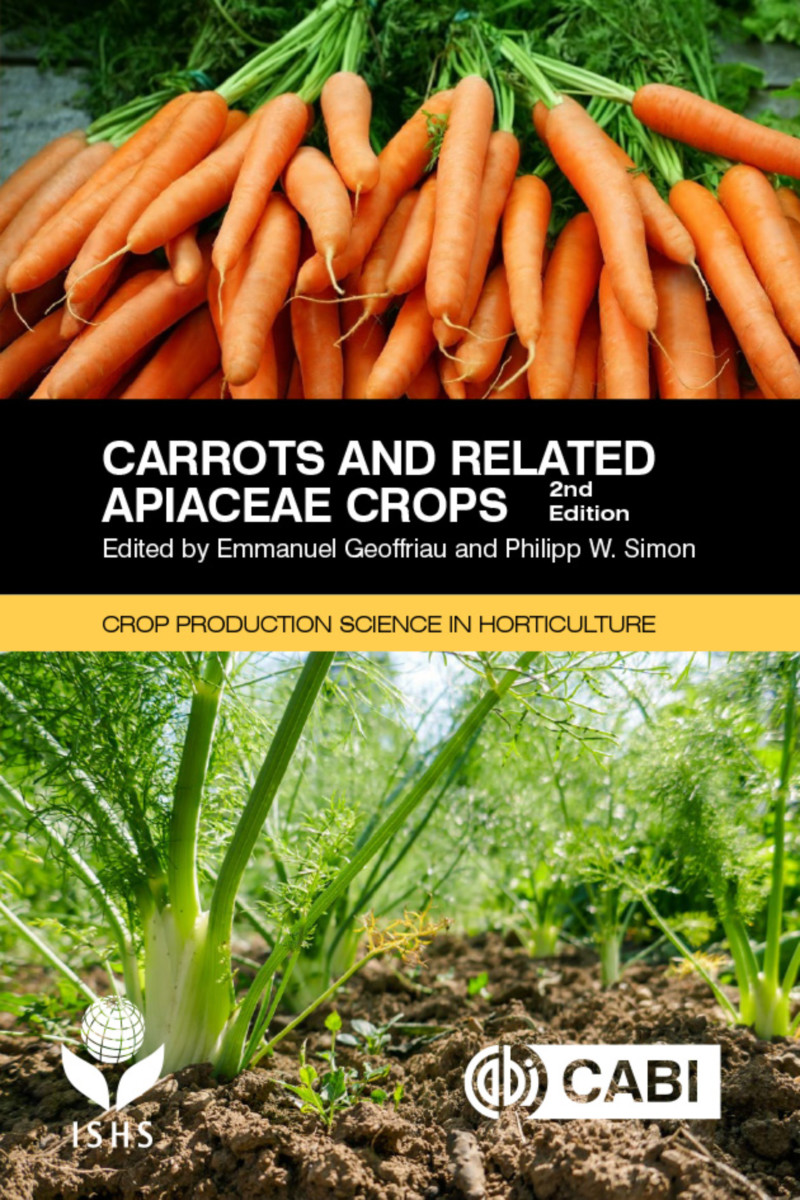Carrots and Related Apiaceae Crops Edition 2
- Publisher
CABI - Published
17th September 2020 - ISBN 9781789240955
- Language English
- Pages 344 pp.
- Size 6" x 9"
- Images full-color figs
Fully updated with new content and full-color figures, the second edition of this successful book reflects developments and growth in our knowledge of carrots and related crops. It covers the scientific basis of their biology and production, with updated technical crop management content. This new edition is divided into three sections: the first considers the crops' importance and main features; the second focuses on carrot, from genetic diversity and breeding to cropping systems, pest and disease management, quality, postharvest, and valorization; and the third presents the main aspects of 13 other cultivated Apiaceae. It contains:
- A dedicated chapter on root quality plus new chapters on organic production and consumer expectations
- Diversity and common features of cultivated Apiaceae species
- The links between scientific principles and cropping systems
- The relation between crop management and product quality
Introduction: Contributions of the Apiaceae to the Agricultural Economy and Global Cuisines
Section I: The Apiaceae, A Family of Vegetable and Aromatic Crops
1: Taxonomy, Origin And Importance of the Apiaceae Family
2: Botany of the Family Apiaceae
3: Apiaceae Seed Production
4: Apiaceae, A Family of Species Rich in Secondary Metabolites – Aromatic Compounds and Medicinal Attributes
Section II: Carrot Production And Management
5: Genetic Diversity and Main Carrot Types
6: Carrot Genetics and Breeding
7: Carrot Growth and Development
8: Carrot Production Practices
9: Integrated Weed Management in Carrots
10: Carrot Disease Management
11: Management of Carrot Pests
12: Carrot Diseases Resulting From Phytoplasmas and Viruses
13: Carrot Physiological Disorders and Crop Adaptation to Stress
14: Carrot Root Quality
15: Cold Storage of Carrots
16: Organic Carrot Production
17: Carrot Organoleptic Quality and Consumer Expectations
Section III: Production and Use of Other Apiaceae Crops
18: Ajowan
19: Angelica
20: Arracacha
21: Caraway and Cumin
22: Celeriac
23: Celery
24: Chervil
25: Coriander
26: Dill
27: Fennel
28: Parsley
29: Parsnip
30: Tuberous Rooted Chervil
Emmanuel Geoffriau
Dr. Emmanuel Geoffriau is Associate Professor in plant sciences applied to vegetable crops. He has experience in several aspects of genetics, genetic diversity and cropping systems of vegetable crops, in particular carrot, in relation with crop quality.
At Agrocampus Ouest in France, he is co-responsible for the research team “Quality and resistance to pests of vegetable crops” in the Institute of Research in Horticulture and Seeds (IRHS) and his research focuses on genetics and quality of the carrot crop. He is responsible for the masters “Fruits and Vegetables, Food and Markets” and “Engineering of horticultural products and cropping systems”. He teaches vegetable crops, post-harvest, genetic diversity and statistics in relation with experimental designs. He serves as reviewer of research projects for national/international agencies, and for several international journals. He is also Chair of the ISHS working group “Carrot and other Apiaceae. “
Philipp W. Simon
Dr. Philipp W. Simon began his scientific studies with a PhD in Genetics from the University of Wisconsin, Madison in 1977. Since 1979, he has been working as a Research Geneticist, and since 1986 a Research Leader, in the Vegetable Crops Research Unit of the USDA Agricultural Research Service (USDA-ARS), and Professor of Horticulture at the University of Wisconsin, Madison. Over the course of his successful career, Dr Simon has published over 200 papers, trained more than 30 PhD students, and won a multitude of prestigious awards, including an Honorary Doctorate from the Agricultural University of Krakow, Poland, and the National Association of Plant Breeders Lifetime Achievement Award. His research in vegetable genetics and breeding focuses on fresh market carrot improvement, targeting improved flavor and nutritional quality, nematode, disease and abiotic stress resistance, and genetic mapping.


